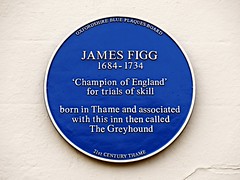James Figg
Commemorated on 2 plaques
James Figg 1684–1734 Champion of England for trials of skill born in Thame and associated with this inn then called The Greyhound
James Figg Pub, Cornmarket, Thame, United Kingdom where they was born near (1684)
Some Notable People Buried Here Edward Forset Lord of the Manor 1630 Sir Edmund Douce Cupbearer to 2 Queens 1644 Dame Francis Howland 1668 Claudius de Crespigny and his wife 1695 Maria de Vierville French refugees 1708 Humphrey Wanley Librarian 1726 James Figg Pugilist 1734 James Gibbs Architect 1754 Edmond Hoyle Writer on games 1769 John Rysbrack Sculptor 1770 John Allen Royal Apothecary 1774 James Ferguson Astronomer 1776 Allan Ramsey Painter 1784 Charles Wesley Divine 1788 Stephen Storace Composer 1796 George Stubbs Painter 1806 3rd Duke of Portland Lord of the Manor 1809 Caroline Watson Engraver 1814
Garden of Rest, Marylebone High Street, London, United Kingdom where they was



